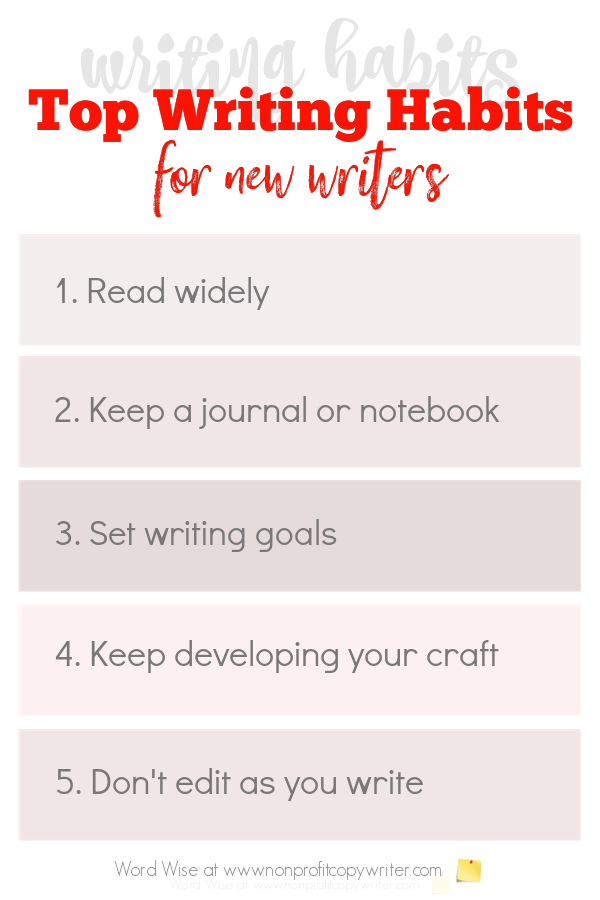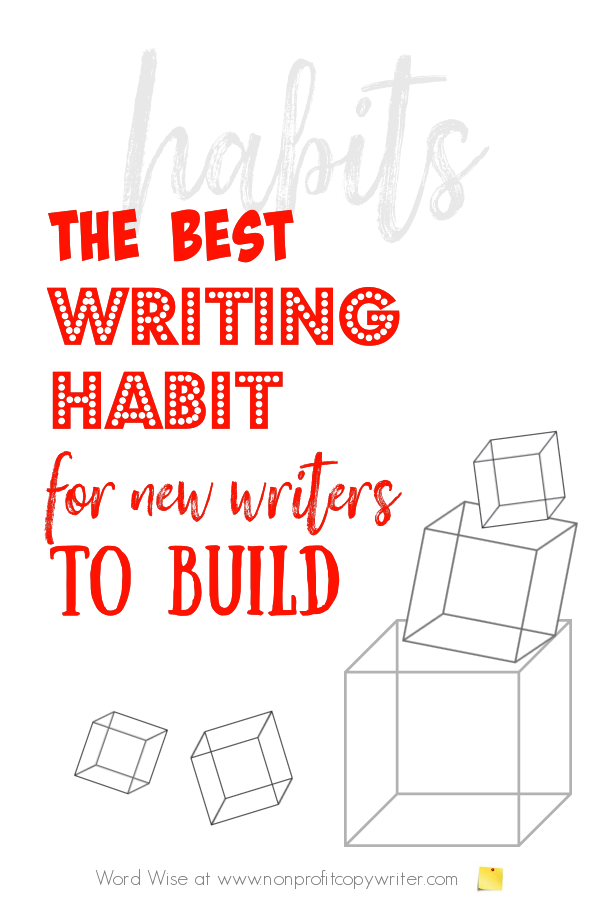Save Time: Get 5 Simple Writing Tips
you can put to use in 10 minutes
The Best Writing Habit
Award-winning writer Kathy Widenhouse has helped hundreds of nonprofits and writers produce successful content , with 750K+ views for her writing tutorials. She is the author of 9 books. See more of Kathy’s content here.
Updated 1.21.26
“Build a writing habit.”
That was the relentless advice I received when I started writing. Furthermore, I was told, the best writing habit is to write every day.
“Habit” sounds B-O-R-I-N-G, especially to a new writer brimming with enthusiasm. A habit is an automatic routine, like flossing my teeth or washing my hands before I eat or double-knotting my sneaker shoelaces before I pound the pavement.
But writing? It’s generated by inspiration and genius. Intriguing insights flood from my brain onto the screen. My fountain of sparkling words can change the world!
Yet all the while, as I willed those magical thoughts to emerge from my fingertips, my mentors’ advice niggled at the edges of my mind.
By providence, these sage words from prolific novelist Stephen King crossed my path. “I think that writers are made, not born,” he wrote in Danse Macabre. “Becoming a writer … is a direct result of conscious will.”
The human will leads to action. In other words, becoming a writer was a choice in how I spent my time. Or as I’d find out, a choice I needed to make over and over, each day, until it became automatic.
Like a habit.
The best writing habits for new (and seasoned writers)
Ask any successful writer to name the habits that have contributed to their achievements, and you’ll hear …
- Read widely. Explore various writing styles, genres, and authors to broaden your understanding of language and storytelling techniques.
- Keep a journal or notebook. Don’t lose those ideas that flit into your mind. Jot down interesting illustrations, fun facts, character ideas, plot twists, or anything that triggers your imagination.
- Set writing goals. Write a blog post every week … one short story per month … 10 pitches a day.
- Learn the craft. Read books on writing, take classes, and follow blogs to improve your understanding of SEO, tight writing, storytelling, plot structure, character development, dialogue, and other essential writing elements. Share your work with others for feedback, whether it’s a critique group, a writing mentor, or trusted friends.
- Don’t edit as you write. Accept the “Messy First Draft” philosophy. Then revise, rework, and refine your content … repeatedly.
Writing habits of famous writers
And that’s not all the good advice writers give to writers. The writing elite, too, have adopted habits that work for them, such as:
- Maintain a daily word count. American authors Stephen King and Nicolas Sparks have adopted a self-imposed a daily 2,000-word writing quota.
- Write at the same time each day. Ernest Hemingway (1899–1961), too, had a daily writing goal, although his was a mere 500 words. However, the Nobel laureate’s trademark habit was to write every morning, as soon as possible after first light.
- Intermingle exercise with writing. American novelist Kurt Vonnegut (1922–2007) interspersed his writing time with walking around the block, a half-hour swim in the late morning, and pushups and sit ups sprinkled in throughout the day.
- Eliminate distractions. “If you want to get work done, you’ve got to learn to unplug,” says Pulitzer Prize finalist Nathan Englander (b.1970) — meaning no texting, no email, no Facebook, no Instagram.
The best habit for new writers to build
Put together, that’s a mountain of solid advice. But where should you start?
Successful writers across the genres and the ages agree: the best writing habit to cultivate is daily writing. Sit down in front of a blank page every day, not just on weekends or when inspiration strikes. Put your ideas into words and then those words onto the screen.
To be frank, it’s a numbers game.
Just as a basketball player improves his free throws with reps, the amount of targeted time you put in improves your skills. Choose to show up and you push through mental blocks. And you churn out content.
For instance, 19th-century English author Anthony Trollope worked for the General Post Office by day, but produced an astonishing 47 novels during his career by writing daily — in 15-minute segments. By stringing bits of time together, he was able to write 3 hours a day. “It was my practice to be at my table every morning at 5:30 AM,” wrote Trollope. “And it was also my practice to allow myself no mercy.”
Best-selling author Max Lucado has written more than 120 books. But writing is just his side hustle accompanying his role as full-time pastor. Early in his writing life, Max developed a writing habit by producing a weekly newsletter column for his church. When he took on more responsibility as a lead pastor, he simply continued his writing routine by sitting down at the keyboard for an hour or two at night after his wife and children went to bed.
How to build a daily writing habit
A habit is an acquired behavior. That means you can build one — if you choose.
Pull an Anthony Trollope and start by writing for 15 minutes today. Then, write for 15 minutes tomorrow. And the next day.
Next week, write every day for 30 minutes.
If that’s all the time you have in between carting kids to soccer practice and answering emails from a demanding boss, stick with your 30 minute per day quota. But it you can stretch that time to an hour or two hours — even just once a week — do so.
While it may take anywhere between one and eight months for a new behavior to feel automatic, there’s good news in a recent University College London study: a missed day or two here and there doesn’t negate the process. Rather, you’ll build a writing habit when you consistently making the choice to write more times than not.
Don’t build a habit. Make a choice.
And don’t fret when your 30-minute session produces nothing but drivel. You’ve produced. With time, your daily sojourn with the keyboard or pencil won’t feel so awkward.
In fact, you’ll find quite the opposite. By choosing each day to sit down at the keyboard and peck out sentences, your writing habit becomes involuntary. “Once the habit loop is formed, the part of the brain that is needed to focus on the behavior or activity is no longer needed,” says clinical psychologist Debra Kawahara, PhD. “It frees up so our brain can focus on other activities or behavior.” Like new ideas. Different characters. Deeper insights or better sentence structure or content flow.
Soon, you will feel wrong if you don’t write — just as it feels wrong to hop into bed without flossing your teeth.
Don’t tell yourself you need to build a writing habit. Instead, make a choice today to write. Make a choice tomorrow to write. And pretty soon, it will become an involuntary part of who you are.
Like a habit.
More Tips for New Writers
Wannabe Writer? Say Goodbye to Your Worst Enemy ...
Don't Market Your Writing. Do This Instead.
20 of the Best Lead Magnets for Writers ...
Get Cured of The Imposter Syndrome ...
Your Writing: Is It “Good Enough”?
How To Get Ideas for Writing – and Never Run Out ...
5 Ways to Become a Better Writer. ..
Manage These 3 Big Distractions When You’re Writing At Home ...
5 Non-Writing Skills Every Writer Needs ...
More Tips for New Writers on our Pinterest board ...
As an Amazon Associate I earn from qualifying purchases.
Share This Page

Named to 2022 Writer's Digest list
BEST GENRE/NICHE WRITING WEBSITE


Stop Wasting Time!
Grab your exclusive FREE guide, "5 Simple Writing Tips You Can Put to Use in 10 Minutes or Less"













